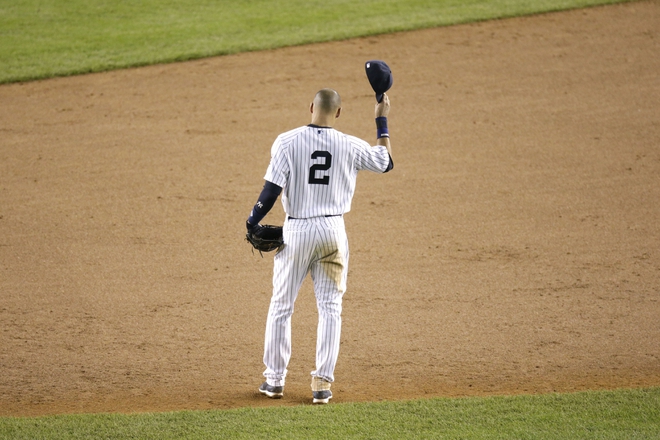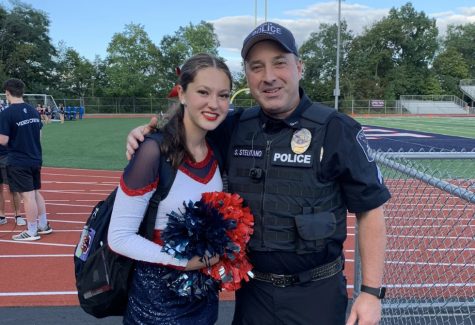Jeter’s journey to the Hall of Fame is finally complete
September 23, 2021
My childhood memories came flashing back faster than a line drive off his bat. Memories of the times I spent watching, analyzing, mimicking, and now, writing about Derek Jeter.
On Septmeber 8, Jeter officially became the Hall of Famer he has always been ever since he first stepped foot onto the big-league diamond in 1995.
Growing up in Pittsburgh, being a fan of the big, bad, Yankees was and is something that’s frowned upon. It was as if I was a fan of the 1700s colonial “Yankees” and they turned rouge on America and sided with the British, not the Yankees that have won 27 championships over the past two centuries.
Perhaps that’s the reason so many people despise the pinstripes: pure jealousy.
But it is the aura and mystique and grandeur and power of the New York Yankees that are some of the reasons I fell in love with them. Another was because of Derek Sanderson Jeter, a name only worthy of being said by the towering tones of legendary Yankees PA announcer Bob Sheppard.
“Now batting for the Yankees, the shortstop, number two, Derek Jeter. Number two,” Sheppard’s voice would echo throughout Yankee Stadium, clear, patient, and powerful. Worthy of Jeter.
There was something special about Number 2, the childhood Yankee fan fulfilling his dream of playing at Yankee Stadium. If only he knew that one day, he would help build the new Yankee Stadium.
It’s possible one of the reasons Jeter drew me, and millions around the world, in was because he reminded us all of … us. Jeter was never the
best athlete on the diamond, and many times looked like the dad who plays catch with his kids in the backyard. He was never the strongest
hitter (his career-high in home runs was 24), and he was never the fastest base runner (most stolen bases in his career was 34).
Jeter never had the quickest feet in the infield or the best hands of any defender or the most range or the strongest arm. He wasn’t a workout
warrior, and had a fairly average body and build — just like most of us.
Yet, Jeter took everything he had and gave it all every single moment in every single game. Not once did he ever give up on an at-bat or decide to figuratively take a day off or dog it on his way to first after he chopped a sure out to third base. Whether it was an April game
against the Royals or an ALCS Game 7 at Fenway Park, Jeter gave everything he had and never looked back.
It was usually in those Game 7s at Fenway, though, that Jeter shined the brightest. When the stage got bigger and bigger, and the lights got
brighter and brighter, he always seemed to come through by getting THE hit or making THE play. It is nearly impossible that anybody will
break his record for postseason hits (200), a mark that’s alongside his other playoff records of most runs scored, total bases, doubles, and
triples in the postseason.
It was Jeter’s locker-room leadership, dugout presence, and utmost respect he gave to both the starting pitcher that night and the no-name
bat boy working the baselines that garnered teammates’ and fans’ respect for him. Those intangibles made Jeter the driving force behind seven World Series teams, five of which won it all.
No way that the late ‘90s Yankees win four World Series in five years if it wasn’t for the dedication and drive that Jeter instilled in every player on the roster. And when those veterans trickled out and a new rotation of players came in, Jeter helped lead a new squad to another championship, this time at the new Yankee Stadium, the house that he helped build.
There are plenty who try to discredit Jeter’s greatness and his accomplishments. The reason for this train of thought is as unknown to me as Jeter’s childhood hometown of Kalamazoo, Michigan is.
Some claim Jeter was a terrible defender. Yet, he won five Gold Gloves, more than Hank Aaron, Peter Rose, Thurmon Munson, Rafael Palmeiro, Wade Boggs, and David Wright.
Others say Jeter was an average hitter. His career batting average is .310, and he hit .321 in the World Series. He’s sixth on the all-time hit list, and led the league in hits twice, including in 2012 at the age of 38.
Was Jeter ever the pure shortstop that Ozzie Smith or Omar Vizquel were, making spectacular plays that routinely would be worthy of opening “SportsCenter”? Never. But if a ball was hard-hit to the hole with two out and two on in the bottom of the ninth with the Yankees up one, I would want Jeter there to make the grab and the play. I would want Jeter up at the plate in a late win-or-go-home playoff game.
Jeter the most reliable shortstop of all time, and his intangibles measured higher than Yankee Stadium’s third deck. When the pressure
was highest, Jeter always delivered. And through it all, he handled himself with the utmost class.
So now, even as my Yankees now struggle to make it into the playoffs (something his teams rarely did), to “The Captain”, Derek Jeter, I tip my cap — the cap that I bought in part because of him.













Matt Johnston • Oct 1, 2021 at 9:46 am
Very, very well said!